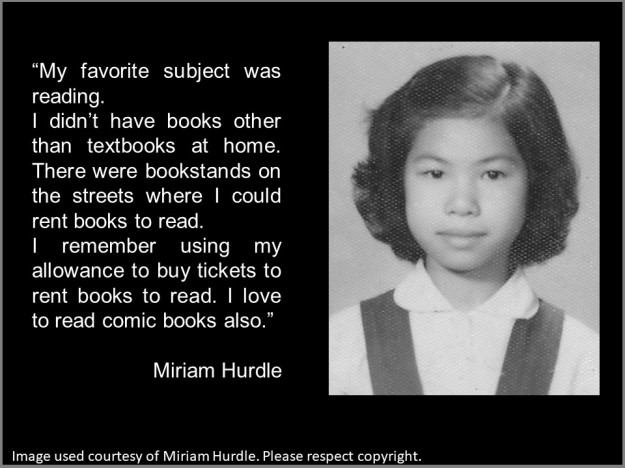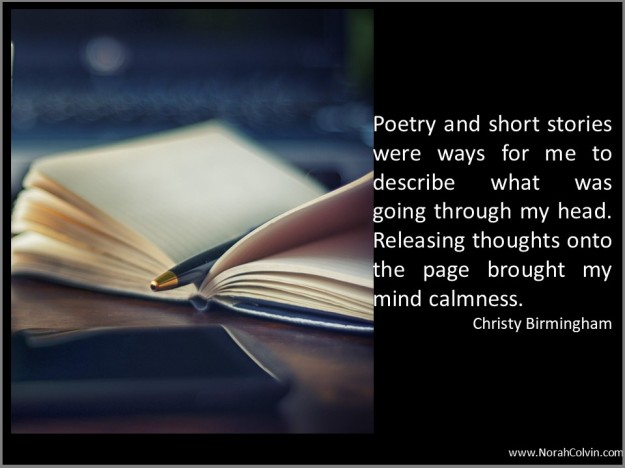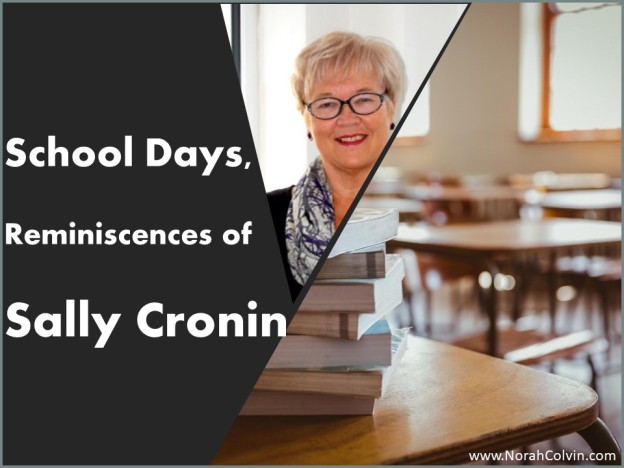Welcome to the School Days, Reminiscences series in which my champion bloggers and authors share reminiscences of their school days. It’s my small way of thanking them for their support and of letting you know about their services and publications.

This week, I am pleased to introduce Miriam Hurdle, poet, blogger, flash fiction writer, photographer, ex-teacher and educator. She blogs at the Showers of Blessings and recently published a book of poems entitled Songs of Heartstrings: Poems of Gratitude and Beatitude.
I first met Miriam at the Carrot Ranch when she rode up and joined in the flash fiction challenges. Since then, we’ve met up in many different places around the blogosphere. Considering she’s been blogging even longer than I; I’m surprised we hadn’t met earlier. We share our thoughts on education and grandchildren, and in fact on anything to do with making our journeys through life the best we can. It is always a pleasure to converse with Miriam.
Before we begin the interview, I invite Miriam to tell you a little of herself:
Miriam Hurdle is a multi-genre writer. She writes poetry, flash fiction, short stories and memoir.
Music has rooted in her life. Being a soloist as a teenager led her to taking voice lessons and to have ongoing singing engagements. She continues to sing soprano in choral groups. Lyrics have a major influence in the natural flow of her melodic writing. She writes memoir in the form of poetry.
She took photos when the films were black and white. Photography is still her enjoyable hobby. Drawing and painting were fun activities as a child. She resumed drawing and watercolor painting several years ago. In her poetry collection, she includes photos and paintings to illustrate the poems.
She earned a Doctor of Education from the University of La Verne in California. After two years of rehabilitation counseling, fifteen years of public-school teaching and ten years in school district administration, she retired and enjoys life with her husband in southern California. She makes frequent visits to her daughter, son-in-law and granddaughter in Oregon.
Welcome, Miriam.
Let’s talk school. First, could you tell us where you attended school?

I went to school from elementary to college in Hong Kong.
Did you attend a government, private or independent school?
In Hong Kong, there are public schools, government subsidized schools, and private schools. I attended two elementary schools sponsored by organizations and they were tuition free schools. One was a Buddhist organization sponsored school, and we had to take a Buddhism class. I remember the nun chanting in class.
What is the highest level of education you achieved?
After I graduated from the college in Hong Kong, I worked for five years, then came to the United States for my graduate studies. I got three master’s degrees – in Religious Education, Counseling, and Educational Administration and a Doctor in Education.
What work or profession did you choose after school and was there anything in school that influenced this choice?
I love music since I was a kid. I sang solos in churches as a teenager. As a result, I took voice lessons and had more singing engagement. It would be my first choice to become a professional musician or teach music, but I could only afford to do music as an enjoyment, not a profession.
When I was in college, I volunteered in Far East Broadcasting Company in several programs. I did singing and recorded children’s stories. When I finished college, FEBC wanted to hire me full time, but the job didn’t pay too much.
Many girls chose to be teachers or nurses back in those days. I accepted a teaching job. I taught Chinese as a Second Language for three years in the Baptist University of Hong Kong. I was also a Director of Children’s Department for two years at Asian Outreach where I wrote four children’s books.
In the U.S. I worked as a Rehabilitation Counselor for two years, taught preschool for two years, taught elementary school for fifteen years, and worked as a school district administration for ten years.
What is your earliest memory of school?
My earliest memory was when I won the Abacus Competition in first grade. The second-grade teacher taught abacus. He came to our classroom to present me the award. Another wonderful memory was that my first-grade teacher Mrs. Leung said I was bright. The thought of being bright influenced my whole life.
When I studied counseling and child development, I learned that positive reinforcement encourages desirable behavior. In fact, it is also true with adults. Instead of pointing fingers or saying, “don’t do this, don’t do that,” we can praise and encourage desirable behavior or responses.
What memories do you have of learning to read?
We did a lot of memorization in reading. We had to recite the reading lessons in early elementary school. My dad helped with my homework and had me memorized the lessons every week. I learned everything in the current lesson before the teacher taught a new lesson. At the fourth grade, I read my dad’s newspapers. My dad and I traded sections to read. I read the horrible news describing the details of crime scenes, read adult fantasy, comic strips and the Sunday children’s section.
My favorite literature was Aesop’s Fables. I also remember learning English grammar such as the regular tenses as walk, walking, walked, walked; and the irregular tenses as go, going, went, gone.
What memories do you have of learning to write?
There was not a lot of creative writing in the lower grades in elementary school. We did a lot of copying the reading lessons. I guess by copying; we remember writing in a proper sentence structure. In upper grade, I learned how to write a story with an opening, the middle, the climax and the conclusion. I remember how I paced my writing and made sure the climax was at the three fourth of the paper. We had a subject in Letter Writing and learned to write different letters.
I learned to write both Chinese and English calligraphy. For Chinese, we wrote in vertical and right to left progression. For English, we wrote alphabet and spellings. I like calligraphy and I still write in calligraphy style in my handwriting. I bought a calligraphic set to address my daughter’s wedding invitations.
What do you remember about math classes?
We learned math the traditional way and learned the mental math. I did addition and subtraction well with an abacus. Doing multiplication and subtraction on the abacus is harder so I don’t remember how to do them. I won the Abacus Competition in the first grade.
What was your favorite subject?

My favorite subject was reading. I didn’t have books other than textbooks at home. There were bookstands on the streets where I could rent books to read. I remember using my allowance to buy tickets to rent books to read. I love to read comic books also.
What did you like best about school?
I like to be with my friends. My best friend Shirley at the fourth grade was my teacher Mrs. Cheung’s daughter. Mrs. Cheung was also a music teacher for the upper grades. We had a singing contest. I entered the competition and got fourth place. Shirley got second place. Shirley played the piano. I went to her house on the weekends and listened to her play for hours.
I keep in touch with Shirley. When we traveled to London, she and her husband took us sightseeing for five days.
What did you like least about school?
I can’t think of anything I didn’t like. There were forty students in each class. We received two report cards a year; they showed our ranking among the class. I got second to ninth places from first to sixth grade. It broke my heart when I got the ninth place. I can’t remember what happened, but it wasn’t because of any subject.
How do you think schools have changed since your school days?
I think the elementary schools in Hong Kong still do a lot of memorization rather than creative learning. My sister and her husband sent their two children to Canadian system International School, and they eventually migrated to Canada. After they got the Canadian citizenship, because of my brother-in-law’s health issue, they went back to Hong Kong and keep the dual citizenship.
What do you think schools (in general) do well?
Since I left Hong Kong forty years ago, I can’t comment about the schools there anymore. But I taught in California thirty years ago, I can comment on the schools in California.
Class size–Kindergarten is 20 students, first to third grades is 25 or fewer students, and fourth to sixth grades is up to 35 students average.
Schools get special funding for English learners to get extra help to learn at their current English levels to catch up with the levels of their classes.
There is special funding to help students from the low-income family because statistic shows that these students have low academic levels.
Many families can afford to send their children to go to preschool. For low-income families, they can send their children to the Headstart program to prepare for the kindergarten.
There are breakfast and lunch served at schools. Low-income families receive free meals for their children. Other children have meals for reduced or full fees. Students can bring their lunches to school also.
How do you think schools could be improved?
At elementary school, there is not enough time of the day to teach all the subject to prepare the students for Junior High or High school. Schools end at 2:30 p.m. for lower grade and 2:45 p.m. for upper grade. For lower grades, teachers teach reading and math in the morning. After lunch, they may teach social studies and physical education. There is no time to teach science. Since the State test at the end of the year doesn’t test science, the teachers give up on teaching that subject.
For upper grade, teachers teach reading and math in their homeroom. Some of them team teach social studies and science so the teacher could do the preparation and teach for more than one class. Students can benefit more learning if the school days are longer.

Thank you for sharing your reminiscences of school and thoughts about education in general, Miriam. It’s been wonderful to have you here. I learned so much about you. I am impressed by your doctorate degree, curious about whether you learned English at school, fascinated by the thought of renting books and envious of your singing ability.
Find out more about Miriam Hurdle
Visit her website: https://theshowersofblessings.com
Or her Amazon Author Page: https://www.amazon.com/Miriam-Hurdle/e/B07K2MCSVW?ref=dbs_p_ebk_r00_abau_000000
Connect with her on social media
Twitter: https://twitter.com/mhurdle112
Facebook: https://www.facebook.com/miriam.hurdle.1
Purchase Songs of Heartstrings from
Amazon Universal Link: http://smarturl.it/SongsofHeartstrings
Amazon UK Link: http://www.amazon.co.uk/dp/B07K1S47W9
Amazon.com Link: http://www.amazon.com/dp/B07K1S47W9
If you missed previous reminiscences, check them out here:
Charli Mills
Sally Cronin
Anne Goodwin
Geoff Le Pard
Hugh Roberts
Debby Gies
Pauline King
JulesPaige
D. Avery
Christy Birmingham
Look for future interviews in this series to be posted on Sunday evenings AEST.
Coming soon:
Robbie Cheadle
Marsha Ingrao
Susan Scott
Mabel Kwong
Sherri Matthews
with more to follow.

Thank you for reading. I appreciate your comments. Please share your thoughts.































